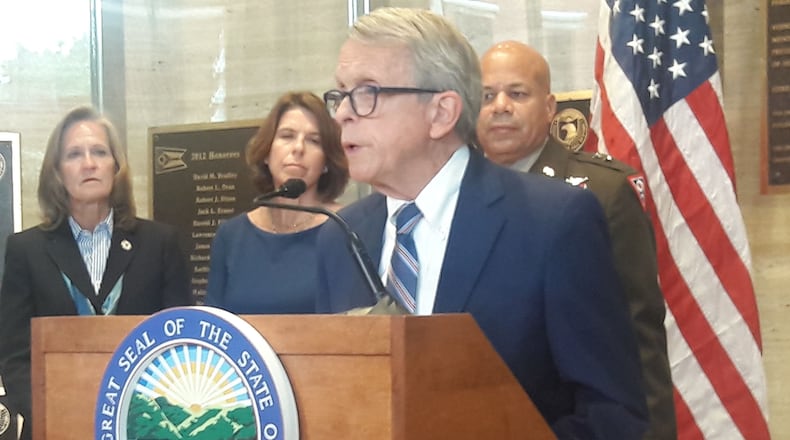“He was proud to serve in the U.S. Navy, and it’s our understanding he planned to make it a career,” DeWine said.
He called for a moment of silence for all service members killed in Afghanistan. Watching recent events is undoubtedly difficult for many who served there and in previous conflicts, DeWine said.
“But we do want you to know that it’s OK to ask for help,” he said.
Maj. Gen. John Harris, Ohio adjutant general, said veterans of Afghanistan did not fight in vain. They did as they were asked with dignity and honor, he said.
“What you did matters,” Harris said.
But even the toughest people need help sometimes, and there is no shame in seeking it, he said.
Not every veteran will need help, and there’s no formula for determining who will, Harris said. Ohio needs healthcare providers who understand military culture – and accept TRICARE insurance, still a rarity in some parts of the state, he said.
Veterans may feel disheartened by scenes of the evacuation from Kabul, questioning the sacrifices they made and mourning lost comrades, said Maj. Gen. (Ret.) Deborah Ashenhurst, Ohio Department of Veterans Services director.
“There is no appropriate or inappropriate way to feel. Our feelings are real and they are ours,” she said.
Ashenhurst urged troubled veterans, or family and friends who realize a veteran is in distress, to look for resources on state websites ohiovets.gov and the redesigned ohiocares.ohio.gov.
At the local level, veterans’ organizations across Ohio are conducting “buddy checks” for veterans who need an understanding fellow veteran to talk to, she said.
The ohiocares.gov site lists what services for veterans are available county by county, said Lori Criss, Ohio Department of Mental Health and Addiction Services director.
Veterans can also speak confidentially to professional counselors 24/7 by calling the National Suicide Prevention Lifeline at 1-800-273-8255 and selecting option 1, she said. Another option, also available 24/7, is the Ohio CareLine at 1-800-720-9616, which can connect callers to resources in their area.
Criss acknowledged reports of people seeking help from the U.S. Department of Veterans Affairs waiting a long time for responses.
“We are aware of the waitlist at the VA. We do encourage people to seek those services,” she said. But while waiting for VA services, those in need of help should also seek it locally: from their doctors, from the Ohio CareLine, from mental health providers in their area and from fellow veterans at veterans’ organizations, Criss said.
She urged the friends and family members of veterans to also use the state websites and other resources to learn the warning signs of suicidal thoughts, and to seek help in asking troubled veterans if they’re considering self-harm.
In many places, calling 911 or going to the local hospital emergency room is the first action to take for a veteran in crisis, though they’ll likely be transferred to other services later, Criss said.
Ohio Secretary of State Frank LaRose, a former Green Beret who served in Iraq, said veterans should know that their families, state and nation need them, and that help is available, much of it from fellow veterans.
State Sen. Frank Hoagland, R-Mingo Junction, a former Navy Seal, said he knows from personal accounts how well peer-to-peer programs for veterans can work.
State Rep. Haraz Ghanbari, R-Perrysburg, who spent seven months in Afghanistan himself, said he knew it has been a “tough couple weeks” for veterans of that war. Veterans can talk freely with each other, he said, but also stressed the involvement of soldiers’ support systems.
“None of us can serve or do what we do without the support of our family and our friends,” Ghanbari said.
He grew emotional as he asked people to pray that the last American troops return home safely.
“May God bless our troops at home and overseas,” Ghanbari said.
How to get help
State websites offering help and links for veterans services:
Free 24/7 hotlines to help veterans:
National Suicide Prevention Lifeline, 1-800-273-8255, option 1
Ohio CareLine, 1-800-720-9616
About the Author

